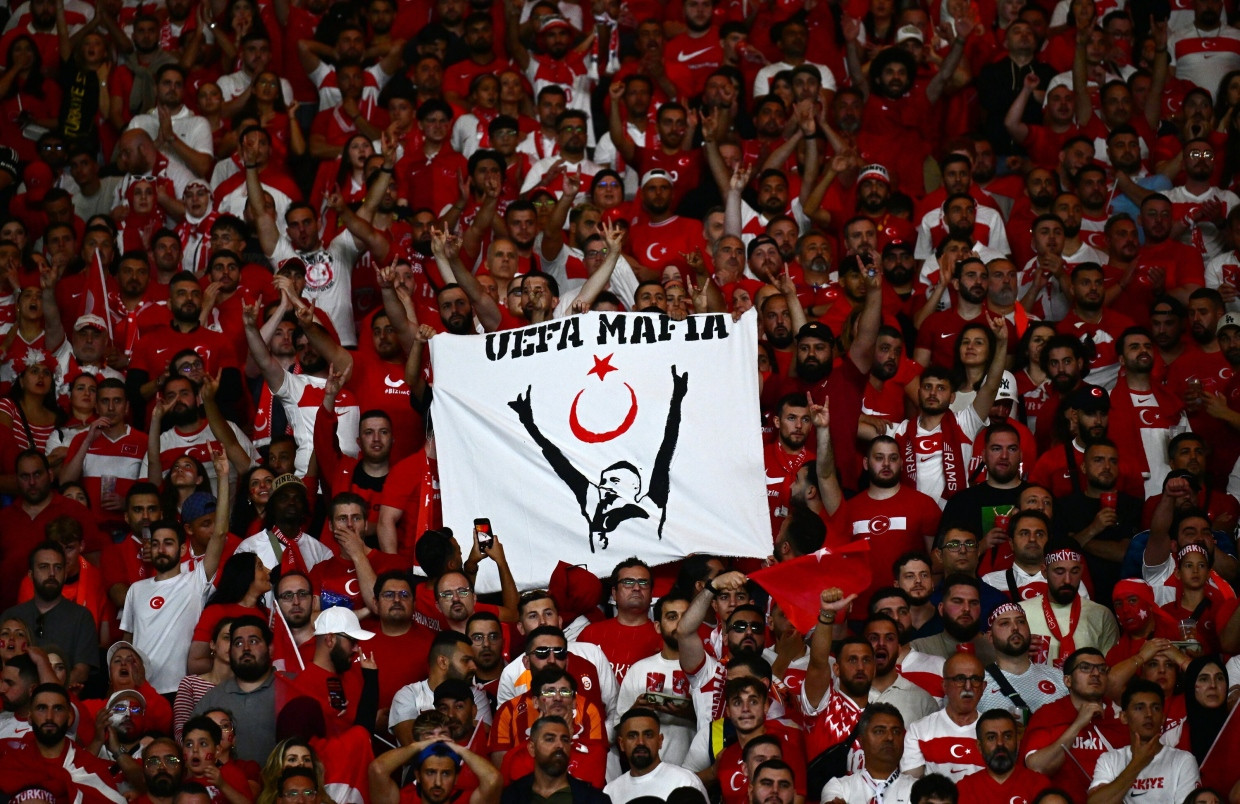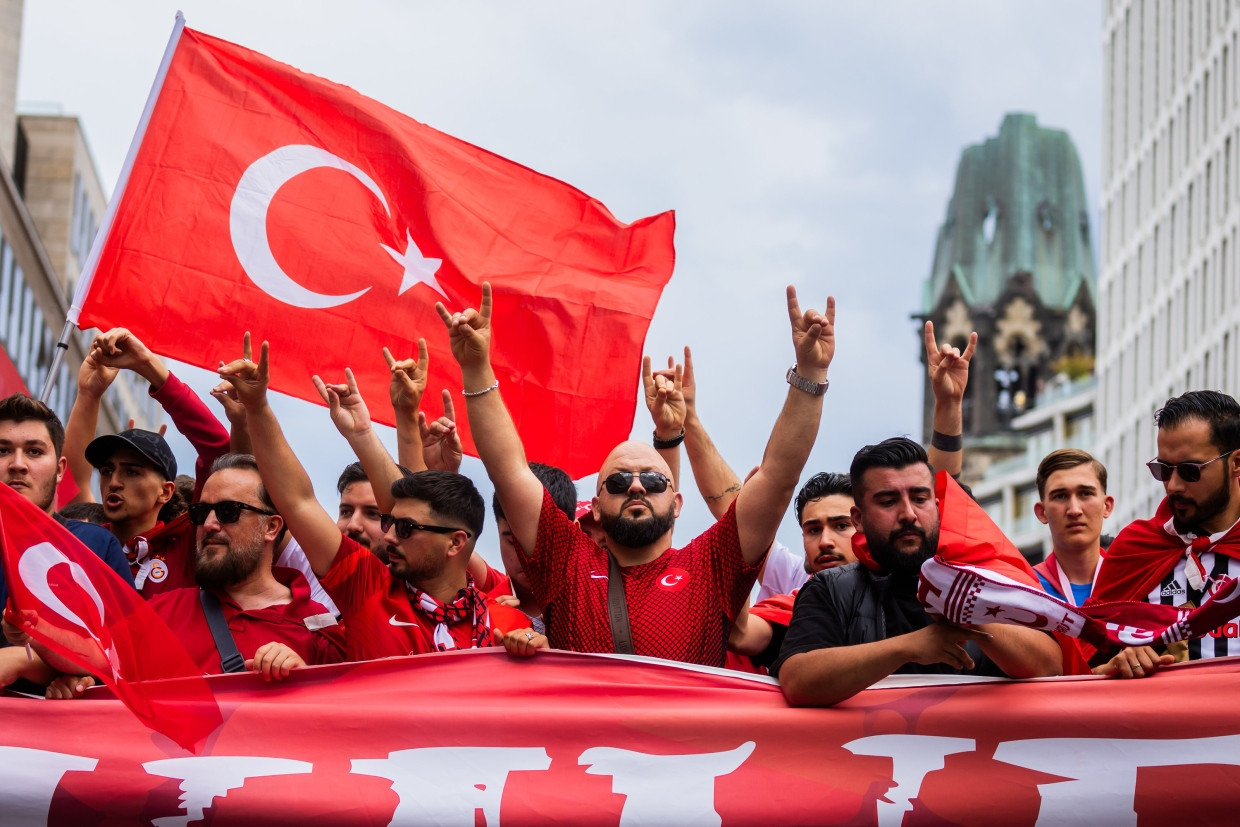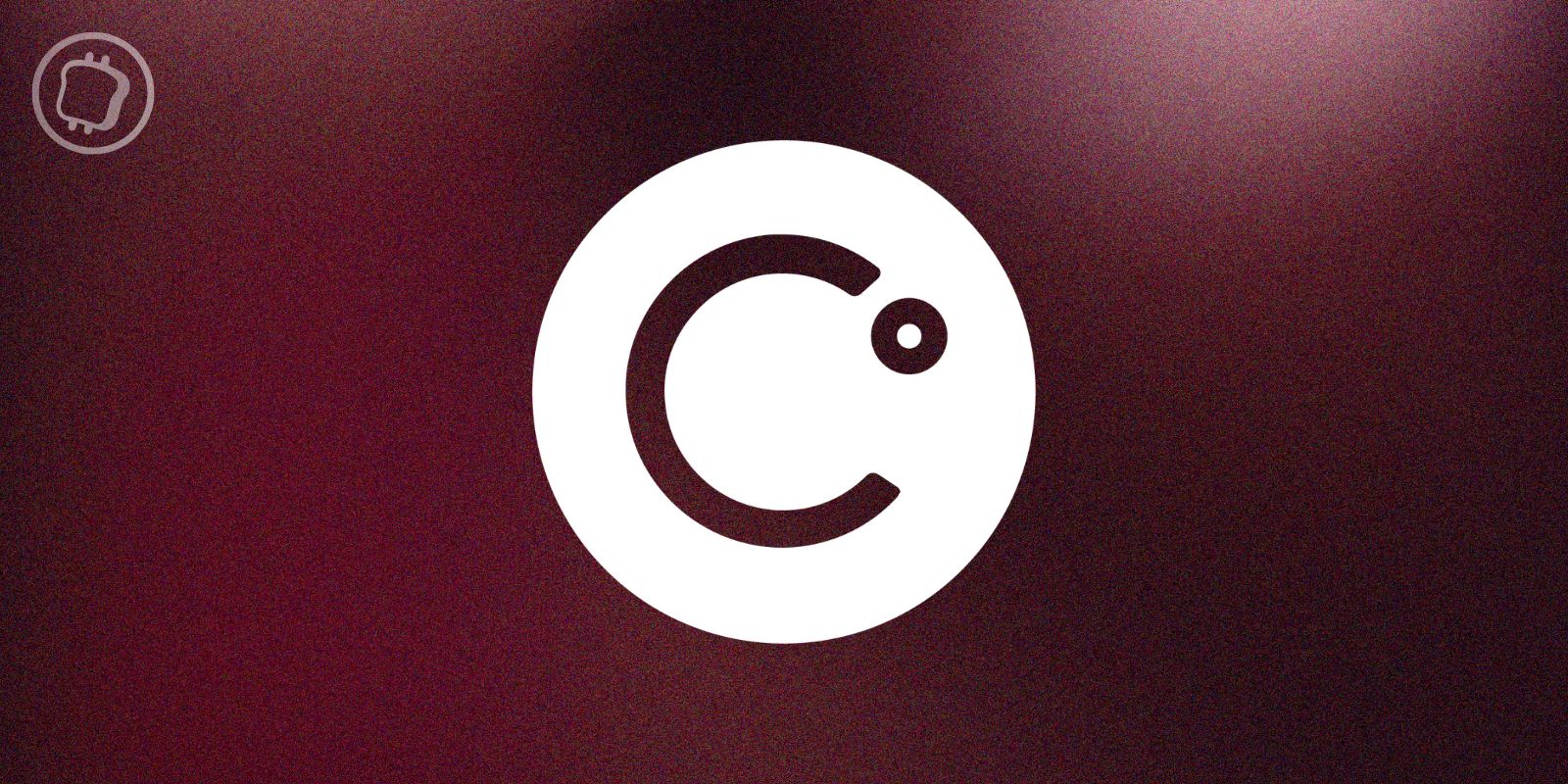Am Ende sind es wohl doch nur ein paar fliegende Bierbecher, die die Stimmung auf der Berliner Fanmeile am Samstagabend kippen lassen. Der übliche Wahnsinn bei Fußballgroßveranstaltungen. Gerade haben die Niederlande ihr zweites Tor im Europameisterschaftsviertelfinale gegen die Türkei erzielt. Der Torjubel mündet in eine handfeste Prügelei. Einige überfordert wirkende Ordner versuchen aufgebrachte türkische und niederländische Fans voneinander zu trennen. Erst nach mehreren Minuten beruhigt sich die Situation. Vorher feierten Türken und Niederländer hier gemeinsam ein weitestgehend friedliches Fußballfest. Der „Wolfsgruß“, um den sich seit Tagen die deutsche Debatte drehte, war zwar auch hier immer wieder zu sehen. Aber der Fußball schien wichtiger.
Der türkische Nationalspieler Merih Demiral hatte mit der Geste seinen Treffer im Achtelfinalspiel der Türkei gegen Österreich zelebriert und damit eine gefühlte Eskalationsspirale in Gang gesetzt, von der zu befürchten war, sie würde in Berlin ihren vorläufigen Höhepunkt finden. Deutsche Politiker, allen voran Bundesinnenministerin Nancy Faeser (SPD), verurteilten die Geste öffentlich. Die UEFA sanktionierte Demiral mit einer Sperre: Er durfte beim Viertelfinale nicht auf den Platz und hätte auch das Halbfinale nicht bestreiten dürfen. In der Türkei zog das scharfe Kritik nach sich. Die Entscheidung sei politisch motiviert, die Reaktionen aus Deutschland selbst fremdenfeindlich. Dann kündigte der türkische Staatspräsident Racip Tayyip Erdoğan seinen Besuch in Berlin an. Das interpretierten viele als Solidaritätsbekundung.
Einen Fanmarsch löste die Polizei auf
Zeigefinger und kleiner Finger nach oben gestreckt, die anderen beiden Finger auf den Daumen gepresst: Der „Wolfsgruß“ ist das Erkennungszeichen der rechtsextremistischen Ülkücü-Bewegung, die in Deutschland auch als „Graue Wölfe“ bekannt ist. Die Bewegung wird vom Verfassungsschutz beobachtet. Verboten ist die Geste hierzulande aber nicht. Trotzdem löste die Berliner Polizei am Samstagnachmittag einen türkischen Fanmarsch zum Berliner Olympiastadion auf – wegen „fortgesetzter politischer Botschaften“ wie sie auf X mitteilte. Eine politische Kundgebung war nicht angemeldet worden.

Turkish fans are also showing off their dexterity outside the stadium. There is still a good hour and a half until kick-off. Turkish and Dutch fans are mingling with each other. Groups of people are forming around the beer stands, and the queues at the stadium entrance are still short. A group of Turkish fans are posing for a group photo with the “wolf salute”. Next to them is Oghuzan, a German Turk in his mid-twenties. He also forms his hand into the “wolf salute”. Of course he will continue to do this, he says. Despite, or perhaps even because of, the media debate. He is not a nationalist, he even made the salute together with the Dutch fans. “It is a 2000-year-old symbol that stands for all Turks in the world.” He is only showing that he is proud to be Turkish. Just because a few right-wing extremists have exploited it, should he stop using it?
Oguzhan came with his uncle Bülent from Gelsenkirchen at short notice. “I didn't want to come at all, and now I've spent 500 euros,” says Bülent. That's how much the ticket from the black market was worth to him. “I only came for that,” he says, and doesn't mean Erdoğan, who he's not interested in at all. The “wolf salute” debate made him angry. “Faeser started the whole discussion, and UEFA itself made it political,” he says. That set something in motion in him. “I thought to myself: now more than ever.”
Just a sign of national pride?
So is the “wolf salute” just a sign of national pride for many Turks? For Erdoğan, Demiral's gesture was just an expression of “enthusiasm”. He compared it to the eagle on the German jerseys.
Turkey researcher Mahir Tokatlı from the RWTH Aachen University is convinced that anyone who uses the gesture knows that it is a right-wing extremist symbol. “That does not mean that everyone who uses it is a right-wing extremist,” he says. The victim narrative that the Turkish government is trying to spread can also appeal to those German Turks who have had negative experiences in Germany: discrimination, everyday racism, recurring debates about integration. “This gesture can also appeal to people who are not right-wing extremists or nationalists at all, because it creates a kind of counter-identity,” says Tokatlı. But many, he says, simply use the sign as a provocation. To show: We will not allow this to be banned.
Not all of the Turkish supporters are happy with this. Berkay, 37 years old, says he has seen a few “wolf salutes” on the way to the stadium. He is there with three friends, all wearing Turkey shirts. He is the only one of them with Turkish roots, and he brought the shirts for his friends. Turkish nationalism worries him. He describes himself as “politically more left-wing”. The “wolf salute” is nothing new to him, he knows it from his old football club. For him, the fact that it is so omnipresent in Berlin on this day has not only to do with Erdoğan or Demiral, but also with the German media: “You jump on it and give the whole thing a stage.”
Was he afraid that the debate could also reinforce prejudices against German Turks among Germans? “Absolutely.” Just as they were walking around Berlin-Mitte in their jerseys, he asked himself whether they would now be branded as “wolf salute” types. He had never experienced open racism himself, but something like that was always there. Many German Turks did not feel accepted. Not even him, although he was born and studied here. He was said to be nice for a Turk and spoke German so well. If he felt that way, how could it be for many other people? The problem is much bigger than the “wolf salute,” he says. “It's about 'us' versus 'the others'.”

A short time later, when the Turkish national anthem was played in the Olympic Stadium, thousands of Turkish fans gave the “wolf salute”. For a long time it looked as if Turkey would advance to the European Championship semi-finals before Erdoğan's eyes. In the end, the Netherlands turned the game around and narrowly won 2:1. On the Ku'damm, where Turkey's victory in the round of 16 was celebrated until the early hours of the morning, it was correspondingly quiet shortly after the final whistle. A few cars with Turkish flags parked at the side of the road drove away quietly. There were still a few motorcades and honking concerts. There was no major escalation. Before arriving in Berlin, Erdoğan had said that the debate about the “wolf salute” would hopefully be over on Saturday “when we leave the field as winners and move on to the next round”. It might have only just begun then.









